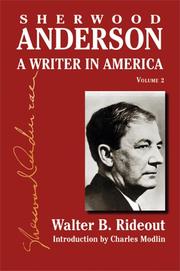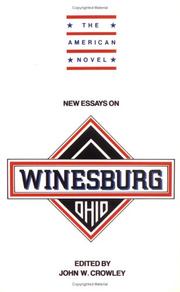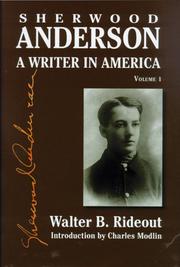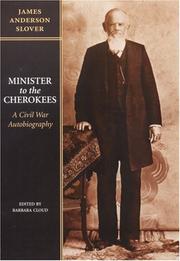| Listing 1 - 10 of 73 | << page >> |
Sort by
|

ISBN: 1282765914 9786612765919 0299220230 9780299220235 9781282765917 9780299220204 0299220206 0299220206 6612765917 Year: 2007 Publisher: Madison University of Wisconsin Press
Abstract | Keywords | Export | Availability | Bookmark
 Loading...
Loading...Choose an application
- Reference Manager
- EndNote
- RefWorks (Direct export to RefWorks)
Book
ISBN: 9789004311015 9004311017 9789004311008 9004311009 Year: 2016 Publisher: Leiden, The Netherlands ;Boston Brill Rodopi
Abstract | Keywords | Export | Availability | Bookmark
 Loading...
Loading...Choose an application
- Reference Manager
- EndNote
- RefWorks (Direct export to RefWorks)
Sherwood Anderson’s Winesburg, Ohio, revisits a classic, twentieth-century American text. Scholars from around the world share their intrepretations and shed new light on Anderson’s contribution to Modernism and his legacy to later writers. They look closely at gender relations, masculinity, place, the nature of community, and the elusive American Dream.
Multi
ISBN: 9781787448704 9781783274987 Year: 2020 Publisher: Woodbridge The Boydell Press
Abstract | Keywords | Export | Availability | Bookmark
 Loading...
Loading...Choose an application
- Reference Manager
- EndNote
- RefWorks (Direct export to RefWorks)

ISBN: 052138723X 0521382831 Year: 1990 Volume: *13 Publisher: Cambridge Cambridge University Press
Abstract | Keywords | Export | Availability | Bookmark
 Loading...
Loading...Choose an application
- Reference Manager
- EndNote
- RefWorks (Direct export to RefWorks)
Book
ISBN: 9781438479651 9781438479675 1438479670 1438479654 Year: 2020 Publisher: Albany, N.Y. SUNY Press
Abstract | Keywords | Export | Availability | Bookmark
 Loading...
Loading...Choose an application
- Reference Manager
- EndNote
- RefWorks (Direct export to RefWorks)
Examines how events in the Cold War and post-Cold War periods shaped the intellectual projects of Perry Anderson and Immanuel Wallerstein.
Book
ISBN: 1283144301 9786613144300 9814299081 9789814299084 9789814299060 9814299065 9814299073 9789814299077 Year: 2010 Publisher: Singapore London World Scientific
Abstract | Keywords | Export | Availability | Bookmark
 Loading...
Loading...Choose an application
- Reference Manager
- EndNote
- RefWorks (Direct export to RefWorks)
In his groundbreaking paper Absence of diffusion in certain random lattices (1958), Philip W. Anderson originated, described and developed the physical principles underlying the phenomenon of the localization of quantum objects due to disorder. Anderson's 1977 Nobel Prize citation featured that paper, which was fundamental for many subsequent developments in condensed matter theory and technical applications. After more than a half century, the subject continues to be of fundamental importance. In particular, in the last 25 years, the phenomenon of localization has proved to be crucial for the
Book
ISBN: 9780252040368 9780252081859 9780252098789 0252098781 0252040368 0252081854 Year: 2016 Publisher: Urbana
Abstract | Keywords | Export | Availability | Bookmark
 Loading...
Loading...Choose an application
- Reference Manager
- EndNote
- RefWorks (Direct export to RefWorks)
Since his explosive debut with the indie sensation 'Hard Eight', Paul Thomas Anderson has established himself as one of contemporary cinema's most exciting artists. His 2002 feature 'Punch-Drunk Love' radically reimagined the romantic comedy. Critics hailed 'There Will Be Blood' as a key film of the new millennium. In 'The Master', Anderson jarred audiences with dreamy amorphousness and a departure from conventional story mechanics. Acclaimed film scholar and screenwriter George Toles approaches these three films in particular, and Anderson's oeuvre in general, with a focus on the role of emergence and the production of the unaccountable.
Motion picture producers and directors --- Anderson, Paul Thomas. --- Anderson, P. T.
Book
ISBN: 9780252082726 9780252041181 9780252099755 0252099753 Year: 2017 Publisher: Urbana, Ill. University of Illinois Press
Abstract | Keywords | Export | Availability | Bookmark
 Loading...
Loading...Choose an application
- Reference Manager
- EndNote
- RefWorks (Direct export to RefWorks)
The Grand Budapest Hotel and Moonrise Kingdom have made Wes Anderson a filmmaking force. Rushmore and The Royal Tenenbaums have become quotable cult classics. Yet every new Anderson release brings out droves of critics eager to charge him with stylistic excess and self-indulgent eclecticism. Donna Kornhaber approaches Anderson's style as the necessary product of the narrative and thematic concerns that define his body of work. Using Anderson's focus on collecting, Kornhaber situates the director as the curator of his filmic worlds, a prime mover who artfully and conscientiously arranges diverse components into cohesive collections and taxonomies. Anderson peoples each mise-en-scne in his ongoing "Wesworld" with characters orphaned, lost, and out of place amidst a riot of handmade clutter and relics. Within, they seek a wholeness and collective identity they manifestly lack, with their pain expressed via an ordered emotional palette that, despite being muted, cries out for attention. As Kornhaber shows, Anderson's films offer nothing less than a fascinating study in the sensation of belonging--told by characters who possess it the least. Covering Anderson's entire oeuvre and including an interview with the director, Wes Anderson is an entertaining look at one of our most beloved and polarizing filmmakers.

ISBN: 029921530X 1282270060 0299215334 9786612270062 9780299215330 9780299215309 6612270063 9781282270060 Year: 2006 Publisher: Madison University of Wisconsin Press
Abstract | Keywords | Export | Availability | Bookmark
 Loading...
Loading...Choose an application
- Reference Manager
- EndNote
- RefWorks (Direct export to RefWorks)
Authors [American ] --- 20th century --- Biography --- Authors, American --- Anderson, Sherwood,

ISBN: 1280465778 9786610465774 0803203020 9780803203020 9781280465772 0803242832 Year: 2001 Publisher: Lincoln University of Nebraska Press
Abstract | Keywords | Export | Availability | Bookmark
 Loading...
Loading...Choose an application
- Reference Manager
- EndNote
- RefWorks (Direct export to RefWorks)
In 1857 James Anderson Slover rode into Indian Territory as the first Southern Baptist missionary to the Cherokee Nation. As the Civil War began to divide the Cherokees along with the rest of the nation, Slover was caught up in one of the most intense dramas of his century. As a farmer, teacher, preacher and evangelist, observer of the Mexican War and the Civil War, contemporary commentator on slavery, and California pioneer, Slover played a small role in changing the face of the nation. It was in 1907, a year after he helped build shelters for people left homeless by the great San Francisco e
Missionaries --- Baptists --- Religious adherents --- Clergy --- Slover, James Anderson,
| Listing 1 - 10 of 73 | << page >> |
Sort by
|

 Search
Search Feedback
Feedback About UniCat
About UniCat  Help
Help News
News